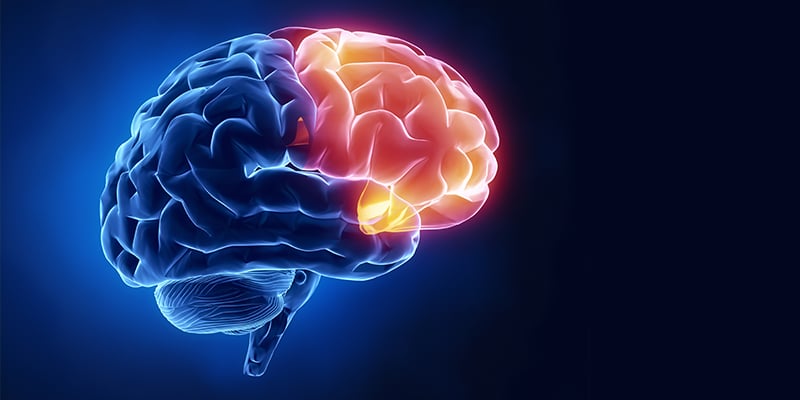
Frontotemporal dementia (also known as frontotemporal degeneration, frontotemporal lobar degeneration, or Pick’s disease) is an umbrella term for a group of brain disorders associated with the progressive loss of nerve cells in the frontal lobes and temporal lobes. Shrinkage in these brain regions leads to changes in communication, behavior, personality, and motor skills. Frontotemporal dementia (FTD) may be misdiagnosed as a mental health problem or Alzheimer’s disease, so it’s important to include brain imaging when seeking a diagnosis.
Frontotemporal dementia is the most common type of dementia in individuals less than 60 years of age. Click To Tweet
ABOUT FRONTOTEMPORAL DEMENTIA
Frontotemporal dementia (FTD) is a progressive disorder that accounts for approximately 10-20% of dementia cases, according to the Association for Frontotemporal Degeneration (AFTD). FTD is the most common type of dementia in individuals less than 60 years of age. Although it usually strikes in mid-life, it can also develop in people aged 20 to 80.
In general, this neurodegenerative disease affects the temporal lobes (involved in memory, learning, and word retrieval) as well as the frontal lobes (involved in cognitive functions, such as planning, judgment, impulse control, and empathy). This results in a variety of issues that impact everyday life.
SIGNS AND SYMPTOMS OF FRONTOTEMPORAL DEMENTIA
The signs and symptoms of FTD vary from one person to the next. In all affected people, however, the symptoms typically worsen over time. More common signs and symptoms of early FTD include:
- Language and communication problems
- Personality changes, including feelings of depression or apathy
- Compulsive behaviors, like repeating words, rubbing hands, or hoarding
- Lack of inhibition, including cursing, saying rude things, or having aggressive outbursts
Unlike Alzheimer’s disease, FTD does not usually cause memory problems in the initial stages. In the later stages of the disorder, however, memory loss is more likely to occur.
TYPES OF FRONTOTEMPORAL DEMENTIA
There are two main types of frontotemporal dementia: behavioral frontotemporal dementia (bvFTD) and primary progressive aphasia.
Behavioral Variant Frontotemporal Dementia (bvFTD)
Accounting for approximately 50% of all cases, this is the most common form of FTD. BvFTD is associated with nerve cell loss in brain regions associated with conduct, planning, self-control, judgment, empathy, and more.
The primary symptoms include changes in personality, apathy, and a deterioration of interpersonal conduct. People with bvFTD may act in ways that are out of character, including saying or doing things that are socially inappropriate. They may progressively lose self-control, show increasingly poor judgment, or develop a lack of empathy. People with this form of FTD may also engage in compulsive behaviors or experience changes in eating habits. One of the key characteristics of this disease is that affected people are unaware of the personality changes taking place and don’t care how their inappropriate behavior impacts others.
Primary Progressive Aphasia (PPA)
People with PPA progressively lose their ability to communicate—speaking, understanding what others are saying, reading, and writing. Individuals may experience difficulty moving their mouth and tongue, which may cause slurred or slowed speech. They may use the wrong words or sounds, omit words, have difficulty recalling words, or have trouble comprehending complex phrases. Like other forms of dementia, PPA is associated with brain atrophy in the frontal and temporal lobes.
WHEN A LOVED ONE HAS FRONTOTEMPORAL DEMENTIA
When an individual is affected by FTD, it isn’t only the person with the disease who suffers. Considering that frontotemporal dementia can be hard to diagnose, it means families often deal with symptoms for years without answers. Seeing a loved one’s personality, behavior, and ability to communicate change in detrimental ways due to frontotemporal dementia can be heartbreaking and confusing.
For loved ones, it can be hard to pinpoint when symptoms began. Loved ones may normalize the early signs and symptoms of frontotemporal dementia, or they attribute them to other things. But eventually, personality changes, socially inappropriate behavior, and difficulty with communication create a challenging environment.
Prior to receiving a diagnosis, these behaviors and changes may cause loved ones to take things personally, which can strain marital relationships and family dynamics. Ultimately, living with someone who has FTD can be extremely stressful.
HOW BRAIN IMAGING HELPS WITH EARLY DETECTION OF FTD
Trying to get answers when a person is experiencing personality changes or other symptoms of frontotemporal dementia can be very challenging, but functional brain SPECT imaging can help. SPECT measures blood flow and activity in the brain and reveals areas of the brain with healthy activity, too much activity, or too little activity.
The brain-imaging work at Amen Clinics, which includes over 225,000 brain scans, shows evidence of the neurodegenerative processes associated with dementia years or even decades before symptoms begin. Low blood flow in the frontal and temporal lobes is a common finding in people with frontotemporal dementia.
Identifying the signs of brain atrophy associated with FTD isn’t the only benefit. SPECT can also help rule out FTD and point to other potential causes of a person’s cognitive changes. Common causes of cognitive issues that are treatable include head trauma, exposure to toxins, and infections such as Lyme disease or COVID.
Although FTD is not curable, getting an early diagnosis is important. With an accurate diagnosis, you can begin early interventions to help protect brain health and maximize a person’s life. In addition, loved ones can seek support to cope with the stress of being a caregiver.
Frontotemporal dementia, Alzheimer’s disease, and other cognitive and mental health issues can’t wait. At Amen Clinics, we’re here for you. We offer in-clinic brain scanning and appointments, as well as mental telehealth, clinical evaluations, and therapy for adults, teens, children, and couples. Find out more by speaking to a specialist today at 888-288-9834 or visit our contact page here.





Have you found ant correlation between dementia and long term CFS leaks?
Comment by Gretchen (me) Greenwood — September 26, 2023 @ 5:50 AM
This helps me understand my brother's condition. He is younger than I am . I visit him but he is in a facility because his dear wife could no longer care for him.
Bless you people for all you do.
Thank you.
Jean Wiedenbeck
Comment by Jean Wiedenbeck — September 26, 2023 @ 11:38 AM
Can these symptons be onset by a frontal lobe severe stroke?
Comment by Sonya van Zantwijk — September 27, 2023 @ 3:13 AM
What are interventions for this diagnosis? Can the new drugs developed for ALZ help slow or reduce the symptoms of FTD?
Comment by Linda U — September 27, 2023 @ 3:44 AM
I wish brain scans such as you are doing would become common in more doctors offices. I am a 65 year old woman who has struggled at time finding words for several years and remember less all the time. Sharing this with my regular doc's do no good. Because I have a good attitude, they feel my brain must be fine because all other parts of my body can be checked when effected in some way, but never the brain. Thank you for taking care of people!
Comment by Susan Bible — September 27, 2023 @ 4:08 AM
I’m finding that my actions follow my quickly mad bad judgment This brief story is incredible! It is me. 23 years ago I had an aneurism on left front temperal. It was fixed by university of IOWA I look back at my behavior since the has been getting inappropriate
Comment by Tim Neubrand — September 27, 2023 @ 5:19 AM
tis me again and i am firmly convinced that any of these problems with the brain needs attention to the set-up of how the head sits on the neck and shoulders – the amount of muscles that hold the head, neck and shoulders is astounding
a good osteopath, or any muscle expert should be able to find muscles that are being held in tension and work towards loosening them
without expert dentists with temporomandibular knowledge can destroy the circulation into the head, including the nerves
and without most people realising that if the skull is distorted, by accidents, birthing problems or bad dentistry then the interaction of brain with the rest of a persons physiology can be impeded
consequently, it would affect a person not only physically, emotionally but intellectually too – if one cannot think straight tis too easy for most humans to be rude to people who aren't as "quick" as them
having spent most of my life being frustrated by an early tbi and distortion of the skull i know what it is to be damaged but not know and also for others to behave in an inhumane way with arrogance
Comment by penny waters — September 27, 2023 @ 9:30 AM
My 59 yo daughter has FTD and has had it for around 7-8 years. She can't speak, walk and is incontinet. She has been in a memory care facility for the past 1 1/2 years. It is very difficult to see her and there no conversation with her. Please, care givers, read some of the many books re FTD. They have helped so changes that she goes through are not a surprise. There are also 2 pages in FB where care givers can share their experiences. Dr. Amen, please continue to publish more about FTD.
Comment by Kathie Hair — September 27, 2023 @ 11:56 PM
My mother was diagnosed with Aphasia. I began to notice it early because I was cued into it. Most people would have missed the early signs in 1986, but I knew something was not right. My father retired the next year and they were very happy in Treasure Island, FL. My mom could collect shells and still take pictures. She was even still driving and volunteering at a Hadassah thrift shop in St. Pete, but the Chrysler LeBaron convertible would come home with dents.
As it progressed my dad took the car keys, and the language skills were non-existent. If she could string together a 3-word sentence we would celebrate. There still was no other diagnosis until they moved to South Florida in 1998 where her Geriatric Psychiatrist just came out with the assumed diagnosis of Alzheimer's. It was a slow demise and she died before her 72nd birthday in 2001.
As other friends' relatives were diagnosed with Alzheimer's over the decades, and I said mine had it, too, it never felt right. There was no similarity to what we went through with her. When Bruce Willis was diagnosed with Aphasia, I sighed with relief that now I could have people understand that word when I use it now.
Your description of PPA here is the first time I have heard of that. She literally would sometimes grab her tongue in frustration that I understood to mean her words just couldn't be formed to communicate what she was trying to say. I think the doctor in Boca was very presumptuous with his quick assessment. Now I don't know if she had Alzheimer's at all? Oh, and everyone figured she had suffered mini-strokes, but her autopsy showed she had not.
Dr. Amen, at one of your lectures a few years ago in Atlanta, Tom Bowen encouraged me to hand you my book called, "Talking to My Selves: Learning to Love the Voices in Your Head" I published in 2009. It's basically about what you call ANTS, but with a psycho/emotional bent to the twenty-four delineated sub-personalities. I assume you put it into a pile somewhere and never read it. But I sure wish you'd take a look.
I dedicated the book to my mom, and in the Acknowledgments I write: "My personal belief is that had you been able to deal with your childhood abuse, it could have helped the deterioration of your consciousness." And I added, "Perhaps one day more research will be done to see if a link exists between emotional complexes and degenerative diseases of the brain."
Unfortunately, I know there's no money in that kind of research, but I'd love to hear your feelings, Dr. Amen.
Comment by Debbie Unterman — September 28, 2023 @ 8:51 AM